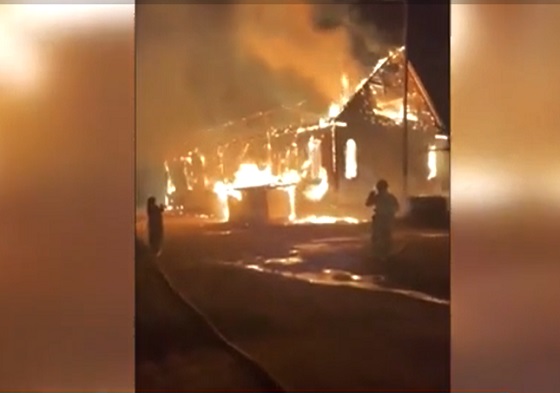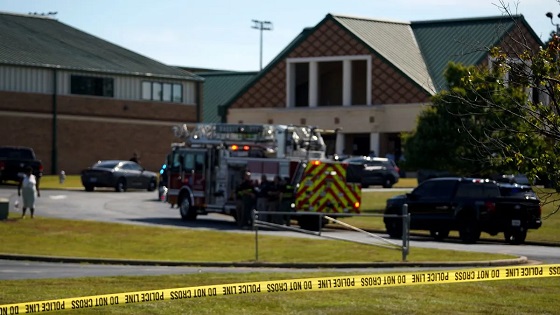Uncategorized
Venezuelans take to streets as uprising attempt sputters

CARACAS, Venezuela — Venezuelans heeded opposition leader Juan Guaidó’s call to fill streets around the nation Wednesday but security forces showed no sign of answering his cry for a widespread military uprising, instead dispersing crowds with tear gas as the political crisis threatened to deepen.
Thousands cheered Guaidó in Caracas as he rolled up his sleeves and called on Venezuelans to remain out in force and prepare for a general strike, a day after his bold attempt to spark a mass military defection against President Nicolas Maduro failed to tilt the balance of power.
“It’s totally clear now the usurper has lost,” Guaidó proclaimed, a declaration belied by events on the ground.
Across town at the Carlota air base near where Guaidó made his plea a day earlier for a revolt, intense clashes raged between protesters and troops loyal to Maduro, making clear the standoff would drag on. There and elsewhere, state security forces launched tear gas and fired rubber bullets while bands of mostly young men armed with makeshift shields threw rocks and set a motorcycle ablaze.
“I don’t want to say it was a disaster, but it wasn’t a success,” said Marilina Carillo, who was standing in a crowd of anti-government protesters blowing horns and whistles.
Opposition leaders hoped Guaidó’s risky move would stir a string of high-ranking defections and shake Maduro’s grip on power. But only the chief of Venezuela’s feared intelligence agency broke ranks, while most others stood steadfast. Some analysts predicted that would make Maduro more emboldened.
The dramatic events could spell even more uncertainty for Venezuela, which has been rocked by three months of political upheaval since Guaidó re-energized a flagging opposition movement by declaring himself interim president, saying Maduro had usurped power.
Now the struggle has heightened geopolitical dimensions, with the United States and more than 50 other nations backing Guaidó as Venezuela’s legitimate president and Maduro allies like Russia lending the beleaguered president military and economic support.
U.S. National Security Adviser John Bolton said Wednesday that Maduro is surrounded by “scorpions in a bottle” and that key figures among his inner circle had been “outed” as dealing with the opposition.
The United States contends Maduro had been ready to flee Tuesday, an airplane already on the tarmac, but was talked out of it by Russian advisers.
Maria Zakharova, a spokeswoman for Russia’s Foreign Ministry, said such assertions were part of a “global information and psychological war against Venezuela and Caracas.”
“There is no proof there was a Russian plane there,” she said. “The U.S. is big on Venezuela and wants to bring this to an end but that cannot do that.”
Protesters like Beatriz Pino, who took to the streets Wednesday waving flags and banging pots and pans, said they weren’t entirely surprised by the military’s response to Guaidó. She said the late President Hugo Chavez politicized Venezuela’s military as he installed a socialist system. Despite the setback, she said she remained committed to the opposition’s call for protest.
“We can’t leave the streets,” she said. “We’ve been in this for years.”
As the standoff drags on, life is becoming even more difficult for Venezuelans, who are struggling with hyperinflation that has rendered salaries worthless as well as severe shortages of food and medicine that have driven about 3 million people to flee the country in recent years.
“We need to get out of this tragedy,” said Ana Camarillo, a housewife.
David Smilde, a Venezuela expert, said the opposition’s thus far unsuccessful attempt to trigger an uprising should provoke a round of reflection.
“Given the balance of power within Venezuela and the geopolitical struggle around it, they need to engage in real politics and real negotiations to move this conflict to a different place,” he said.
At a large pro-Maduro rally Wednesday, ruling party leader Diosdado Cabello said that “as a bloc” Venezuela’s military remained intact and united behind Maduro. He likened opposition leaders to “walking zombies.”
Luis Scott was among those wearing bright red shirts in solidarity with the socialist government and said he
“We are fighting for our freedom,” the fisherman said.
While Maduro maintains a devout core of fervent supporters first inspired by Chavez, attendance at such shows of support is viewed as a requirement of their jobs.
At the Plaza Francia in Caracas’ Altamira
“The fight is down there!” he said, gesturing to the direction of a military base.
Mayor Gustavo Duque said the Salud Chacao medical
Maduro appeared at the socialist party rally Wednesday afternoon, saying U.S. leaders had been fooled by the opposition into believing he was about to flee Venezuela. He said the Trump administration was part of a “pot of lies” and likened the ordeal to “fake news.”
He promised to put all conspirators behind bars.
“Sooner or later they’ll go to jail and pay for their betrayal and their crimes,” he said.
Giancarlo Morelli of the British analysis group Economist Intelligence Unit said Maduro faces peril whatever path he takes with Guaidó over the uprising attempt.
“Failing to arrest Mr. Guaidó would be perceived as an important sign for weakness from Mr. Maduro,” Morelli said. “But arresting Mr. Guaidó risks a strong counter-reaction from the U.S.,” which has been ratcheting up sanctions.
For many Venezuelans, the turmoil has become an almost normal state of affairs.
Johanns Davila walked his dog along a street in the capital littered with shotgun shells, tear gas canisters and a charred motorcycle, the remnants of skirmishes between the opposition and state security.
“We need to get people out and recover the country,” Davila said.
___
Associated Press writers Christine Armario in Cucuta, Colombia, Fabiola Sanchez and Jorge Rueda in Caracas contributed to this report.
___
This story deletes extraneous ‘against’ in 4th paragraph.
Scott Smith And Christopher Torchia, The Associated Press
Uncategorized
CNN’s Shock Climate Polling Data Reinforces Trump’s Energy Agenda


From the Daily Caller News Foundation
As the Trump administration and Republican-controlled Congress move aggressively to roll back the climate alarm-driven energy policies of the Biden presidency, proponents of climate change theory have ramped up their scare tactics in hopes of shifting public opinion in their favor.
But CNN’s energetic polling analyst, the irrepressible Harry Enten, says those tactics aren’t working. Indeed, Enten points out the climate alarm messaging which has permeated every nook and cranny of American society for at least 25 years now has failed to move the public opinion needle even a smidgen since 2000.
Appearing on the cable channel’s “CNN News Central” program with host John Berman Thursday, Enten cited polling data showing that just 40% of U.S. citizens are “afraid” of climate change. That is the same percentage who gave a similar answer in 2000.
Dear Readers:
As a nonprofit, we are dependent on the generosity of our readers.
Please consider making a small donation of any amount here.
Thank you!
Enten’s own report is an example of this fealty. Saying the findings “kind of boggles the mind,” Enten emphasized the fact that, despite all the media hysteria that takes place in the wake of any weather disaster or wildfire, an even lower percentage of Americans are concerned such events might impact them personally.
“In 2006, it was 38%,” Enten says of the percentage who are even “sometimes worried” about being hit by a natural disaster, and adds, “Look at where we are now in 2025. It’s 32%, 38% to 32%. The number’s actually gone down.”
In terms of all adults who worry that a major disaster might hit their own hometown, Enten notes that just 17% admit to such a concern. Even among Democrats, whose party has been the major proponent of climate alarm theory in the U.S., the percentage is a paltry 27%.
While Enten and Berman both appear to be shocked by these findings, they really aren’t surprising. Enten himself notes that climate concerns have never been a driving issue in electoral politics in his conclusion, when Berman points out, “People might think it’s an issue, but clearly not a driving issue when people go to the polls.”
“That’s exactly right,” Enten says, adding, “They may worry about in the abstract, but when it comes to their own lives, they don’t worry.”
This reality of public opinion is a major reason why President Donald Trump and his key cabinet officials have felt free to mount their aggressive push to end any remaining notion that a government-subsidized ‘energy transition’ from oil, gas, and coal to renewables and electric vehicles is happening in the U.S. It is also a big reason why congressional Republicans included language in the One Big Beautiful Bill Act to phase out subsidies for those alternative energy technologies.
It is key to understand that the administration’s reprioritization of energy and climate policies goes well beyond just rolling back the Biden policies. EPA Administrator Lee Zeldin is working on plans to revoke the 2010 endangerment finding related to greenhouse gases which served as the foundation for most of the Obama climate agenda as well.
If that plan can survive the inevitable court challenges, then Trump’s ambitions will only accelerate. Last year’s elimination of the Chevron Deference by the Supreme Court increases the chances of that happening. Ultimately, by the end of 2028, it will be almost as if the Obama and Biden presidencies never happened.
The reality here is that, with such a low percentage of voters expressing concerns about any of this, Trump and congressional Republicans will pay little or no political price for moving in this direction. Thus, unless the polls change radically, the policy direction will remain the same.
David Blackmon is an energy writer and consultant based in Texas. He spent 40 years in the oil and gas business, where he specialized in public policy and communications.
Uncategorized
Kananaskis G7 meeting the right setting for U.S. and Canada to reassert energy ties


Energy security, resilience and affordability have long been protected by a continentally integrated energy sector.
The G7 summit in Kananaskis, Alberta, offers a key platform to reassert how North American energy cooperation has made the U.S. and Canada stronger, according to a joint statement from The Heritage Foundation, the foremost American conservative think tank, and MEI, a pan-Canadian research and educational policy organization.
“Energy cooperation between Canada, Mexico and the United States is vital for the Western World’s energy security,” says Diana Furchtgott-Roth, director of the Center for Energy, Climate and Environment and the Herbert and Joyce Morgan Fellow at the Heritage Foundation, and one of America’s most prominent energy experts. “Both President Trump and Prime Minister Carney share energy as a key priority for their respective administrations.
She added, “The G7 should embrace energy abundance by cooperating and committing to a rapid expansion of energy infrastructure. Members should commit to streamlined permitting, including a one-stop shop permitting and environmental review process, to unleash the capital investment necessary to make energy abundance a reality.”
North America’s energy industry is continentally integrated, benefitting from a blend of U.S. light crude oil and Mexican and Canadian heavy crude oil that keeps the continent’s refineries running smoothly.
Each day, Canada exports 2.8 million barrels of oil to the United States.
These get refined into gasoline, diesel and other higher value-added products that furnish the U.S. market with reliable and affordable energy, as well as exported to other countries, including some 780,000 barrels per day of finished products that get exported to Canada and 1.08 million barrels per day to Mexico.
A similar situation occurs with natural gas, where Canada ships 8.7 billion cubic feet of natural gas per day to the United States through a continental network of pipelines.
This gets consumed by U.S. households, as well as transformed into liquefied natural gas products, of which the United States exports 11.5 billion cubic feet per day, mostly from ports in Louisiana, Texas and Maryland.
“The abundance and complementarity of Canada and the United States’ energy resources have made both nations more prosperous and more secure in their supply,” says Daniel Dufort, president and CEO of the MEI. “Both countries stand to reduce dependence on Chinese and Russian energy by expanding their pipeline networks – the United States to the East and Canada to the West – to supply their European and Asian allies in an increasingly turbulent world.”
Under this scenario, Europe would buy more high-value light oil from the U.S., whose domestic needs would be back-stopped by lower-priced heavy oil imports from Canada, whereas Asia would consume more LNG from Canada, diminishing China and Russia’s economic and strategic leverage over it.
* * *
The MEI is an independent public policy think tank with offices in Montreal, Ottawa, and Calgary. Through its publications, media appearances, and advisory services to policymakers, the MEI stimulates public policy debate and reforms based on sound economics and entrepreneurship.
As the nation’s largest, most broadly supported conservative research and educational institution, The Heritage Foundation has been leading the American conservative movement since our founding in 1973. The Heritage Foundation reaches more than 10 million members, advocates, and concerned Americans every day with information on critical issues facing America.
-

 Censorship Industrial Complex2 days ago
Censorship Industrial Complex2 days agoCanada’s privacy commissioner says he was not consulted on bill to ban dissidents from internet
-

 Business2 days ago
Business2 days agoFormer Trump Advisor Says US Must Stop UN ‘Net Zero’ Climate Tax On American Ships
-

 Alberta2 days ago
Alberta2 days agoEnbridge CEO says ‘there’s a good reason’ for Alberta to champion new oil pipeline
-

 National1 day ago
National1 day agoDemocracy Watch Renews Push for Independent Prosecutor in SNC-Lavalin Case
-

 Business2 days ago
Business2 days agoOver two thirds of Canadians say Ottawa should reduce size of federal bureaucracy
-

 Alberta12 hours ago
Alberta12 hours agoPremier Smith addresses the most important issue facing Alberta teachers: Classroom Complexity
-

 Alberta12 hours ago
Alberta12 hours agoAlberta taxpayers should know how much their municipal governments spend
-

 Indigenous21 hours ago
Indigenous21 hours agoConstitutional lawyer calls for ‘false’ claims to end in Canadian residential schools burials






